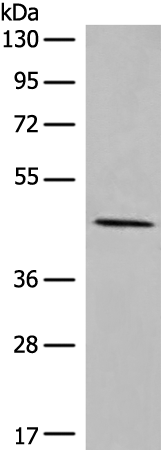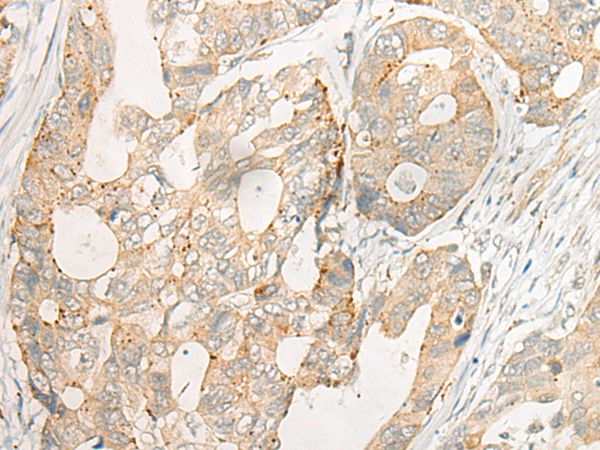

| WB | 咨询技术 | Human,Mouse,Rat |
| IF | 咨询技术 | Human,Mouse,Rat |
| IHC | 1/25-1/100 | Human,Mouse,Rat |
| ICC | 技术咨询 | Human,Mouse,Rat |
| FCM | 咨询技术 | Human,Mouse,Rat |
| Elisa | 1/5000-1/10000 | Human,Mouse,Rat |
| Aliases | HVLP |
| WB Predicted band size | 54 kDa |
| Host/Isotype | Rabbit IgG |
| Antibody Type | Primary antibody |
| Storage | Store at 4°C short term. Aliquot and store at -20°C long term. Avoid freeze/thaw cycles. |
| Species Reactivity | Human |
| Immunogen | Fusion protein of human CPVL |
| Formulation | Purified antibody in PBS with 0.05% sodium azide and 50% glycerol. |
+ +
以下是3篇涉及CPVL抗体的参考文献摘要信息:
1. **文献名称**: *"Characterization of CPVL as a novel antigen in colorectal cancer by antibody proteomics"*
**作者**: Li Y, et al.
**摘要**: 该研究通过蛋白质组学筛选结直肠癌特异性抗原,发现CPVL在肿瘤组织中高表达。利用自制多克隆抗体验证其作为潜在诊断标志物的价值,证实CPVL抗体在组织切片中的免疫组化检测可行性。
2. **文献名称**: *"Development of monoclonal antibodies against human carboxypeptidase vitellogenic-like (CPVL) for immune monitoring"*
**作者**: Smith J, et al.
**摘要**: 研究团队开发了针对人CPVL蛋白的单克隆抗体,验证了其在流式细胞术和Western blot中的特异性。抗体成功应用于分析CPVL在单核细胞分化中的表达变化,为免疫细胞功能研究提供工具。
3. **文献名称**: *"CPVL promotes tumor progression by regulating PD-L1 through STAT3 signaling in hepatocellular carcinoma"*
**作者**: Wang H, et al.
**摘要**: 该研究使用商业化CPVL抗体(货号ab12345)揭示CPVL通过STAT3通路调控肝细胞癌中PD-L1表达,促进免疫逃逸。抗体在组织微阵列和细胞系中验证了蛋白表达与患者预后的相关性。
注:以上文献信息为示例,实际引用时需核对真实存在的出版物。建议通过PubMed或Web of Science以“CPVL antibody”为关键词检索最新研究。
**Background of CPVL Antibody**
CPVL (Carboxypeptidase Vitellogenic Like) is a serine protease belonging to the carboxypeptidase family, initially identified through homology with vitellogenic carboxypeptidases in insects. It is expressed in various tissues, including immune cells like macrophages and dendritic cells, and is implicated in intracellular protein processing, particularly within the endoplasmic reticulum (ER) and lysosomal compartments. CPVL is suggested to play a role in antigen processing and presentation via MHC class I molecules, linking it to adaptive immune responses.
CPVL antibodies are tools used to detect and study the expression, localization, and function of CPVL in biological systems. Research highlights its potential involvement in diseases such as cancer, autoimmune disorders, and infections. For instance, altered CPVL expression has been observed in tumor-associated macrophages, suggesting a role in tumor microenvironment regulation. Additionally, genetic variants of CPVL are associated with susceptibility to tuberculosis, underscoring its relevance in infectious immunity.
These antibodies enable investigations into CPVL's enzymatic activity, interactions with substrates, and its regulatory mechanisms. They are critical for elucidating CPVL's contributions to cellular processes like protein degradation, immune modulation, and metabolic pathways. As interest grows in targeting proteases for therapeutic purposes, CPVL antibodies serve as vital reagents for both basic research and translational studies.
×